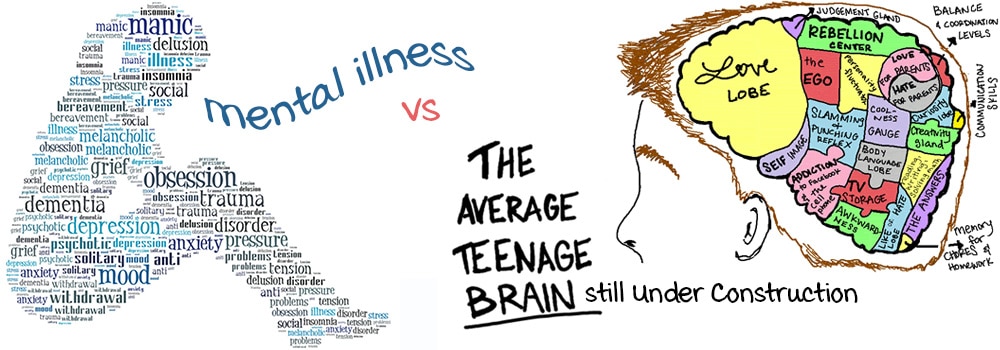Setting boundaries in a new relationship
How to Set Healthy Boundaries in Your Relationship
September 3, 2020
Given the current state of the world, you may be spending more time than ever with your partner. If you find that you are together a lot, it may not always be easy to set necessary boundaries. Perhaps you have already set healthy boundaries for your relationship, but they have been hard to maintain during this time. Setting boundaries (or reevaluating them) in your relationship will ultimately help reduce stress and ensure that you have a healthy dynamic with your partner.
Here are six tips for setting healthy boundaries in your relationship:
Know That Boundaries Are Healthy for Your RelationshipBefore setting boundaries, consider acknowledging
why they are important for you. Boundaries are an integral part of healthy relationships because they help to maintain a balance between you and your partner. They also help minimize conflict, because they establish a precedent for what you both expect from each other. Having boundaries can actually bring you closer to your partner because they are set through open communication.
Communicating transparently is an important part of every healthy relationship. When discussing boundaries with your partner, being honest about what you are comfortable with or not comfortable with will ensure that they know what you truly expect from them. You could even try writing down your expectations so that you are clear about what you want when sharing them with your partner.
Listen to What Your Partner NeedsSince you expect your partner to honor your boundaries, it’s also important to fully listen to their needs as well. Relationships are a two-way street, so you will need to listen to the boundaries they want to set and discuss those as well. Remember, that in a relationship, you should be able to say anything, but the WAY you say it, matters. Consider reading up on soft startups to communicate more effectively.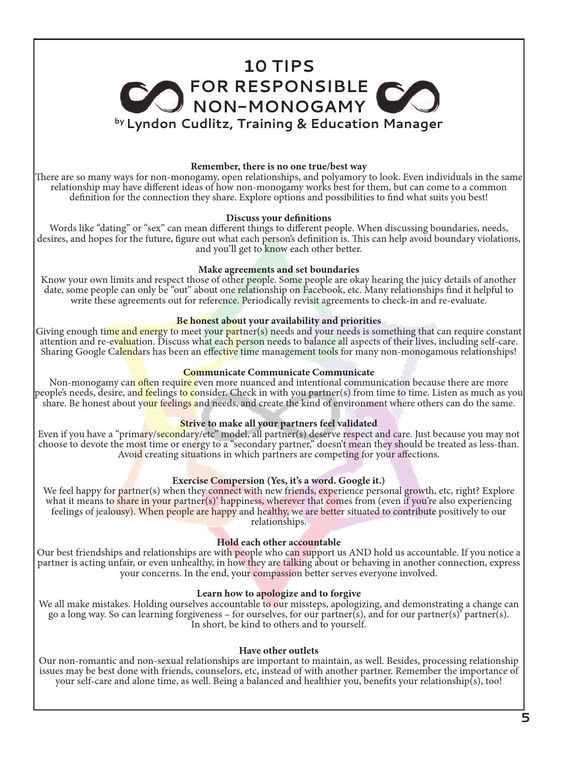
This tip is especially applicable at the moment. If you’re spending a lot of time together right now, be sure to communicate with each other about when you need time alone. It’s just as important to set aside time for yourself as it is to have quality time with the person you love.
Establish How Comfortable You Are In the Scope of COVID-19Your boundaries surrounding your interactions with friends and family, and your overall social expectations during this time, are likely to have changed. If you haven’t already, consider having a conversation with your partner about how comfortable you both are with being around other people during this time and in what type of setting.
Communicate With RespectHealthy relationships include respect from both sides. The best way to communicate your boundaries with your partner is with compassion, understanding and respect for each other’s expectations.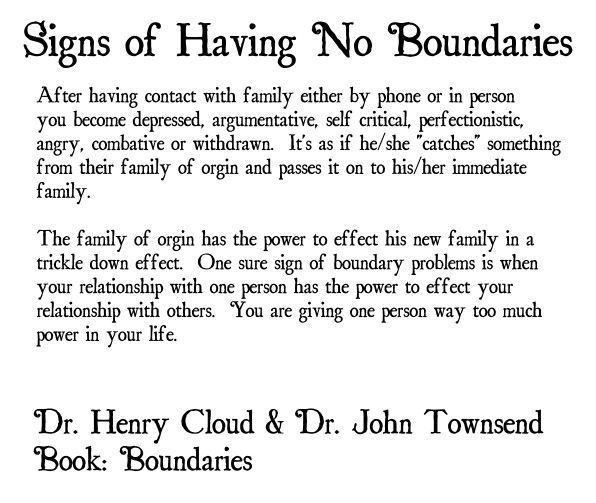 Having respect each time you communicate will ultimately make your relationship healthier and stronger.
Having respect each time you communicate will ultimately make your relationship healthier and stronger.
COVID-19 and Relationships
Expressing Feelings in a Relationship
Cheers to Healthy Relationships
Tips for Saving Your Relationship
If you would like to begin Relationship Enhancement Counseling, request an appointment with Eugene Therapy today.
15 Ways of Setting Boundaries in a New Relationship
In This Article
The beginning of a relationship is the perfect time to set dating boundaries. It will set the tone for the rest of your time together in a way that builds respect.
Setting boundaries in a new relationship is the foundation for a healthy romantic partnership.
New relationship boundaries let your spouse know what is and isn’t okay with you. It allows love to grow in a way that makes you both feel comfortable and valued by your partner.
If boundaries are so healthy for relationships, why do most people have such a hard time setting them?
Keep reading to discover what new relationship rules to set and how to overcome the fear of saying no.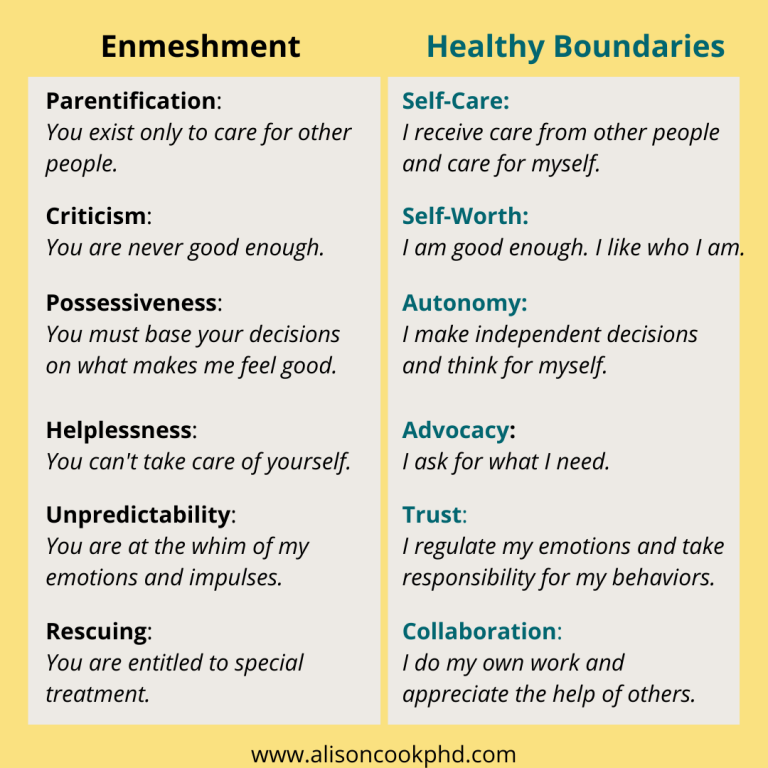
A boundary is something that indicates your limits. Think of a boundary line on a map or the edge of something.
Dating boundaries refer to your limits in a relationship. It’s what you need to maintain a healthy space and individuality inside of a romantic relationship.
Examples of what might be on a relationship boundaries list are:
- Feeling comfortable kissing, but not going any further than that physically
- Feeling comfortable cuddling at home but not wanting to show public displays of affection
- Feeling comfortable following each other online but not feeling comfortable sharing passwords
Do you see how limits indicate the end of your comfort levels and the start of discomfort? By sharing your boundaries with your partner, you help them understand how to avoid making you feel bad.
Related Reading: 6 Types of Boundaries in Relationships & How to Maintain ThemHow do you set boundaries when starting a relationship
The beginning of relationships is the best time to set dating boundaries. The sooner your partner knows where your limits are, the sooner they can start respecting them and learning to understand you better.
The sooner your partner knows where your limits are, the sooner they can start respecting them and learning to understand you better.
Routines can be difficult to break. When you set dating relationship boundaries at the start of your relationship, you avoid falling into bad habits that make it harder to adjust how you treat each other.
15 ways of setting boundaries in a new relationshipBoundaries in relationships are essential. They help prevent enmeshment.
When you think of the word enmeshment, you probably think of something tangled together, like a fishing wire or a pile of necklaces.
Once something is tangled, it takes time to untangle it.
The same is true of dating relationship boundaries. Once you become enmeshed with your partner, you may feel trapped – and it can feel like forever until your relationship adjusts to your needs.
Beginning on the right note is why it is so important to address boundaries at the start of a new relationship before any destructive patterns have formed.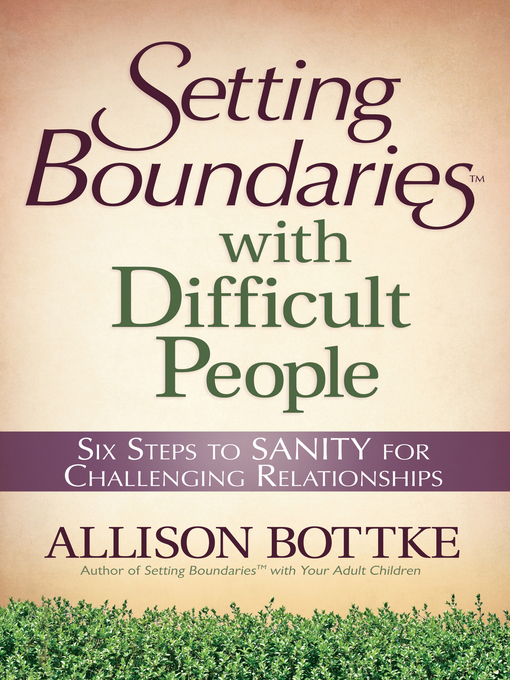
Here are some ways of setting boundaries in a new relationship that could work for you:
1. Communicate your needsOne of the biggest tips for setting boundaries in relationships is to communicate.
Studies show that couples who communicate have more effective and positive interactions.
Communication is beneficial for setting boundaries when dating. Communicating regularly helps you get to know each other better and allows you to revisit boundaries that have changed since you last talked about them.
Related Reading: 20 Ways to Improve Communication in a Relationship2. Accept your past
Setting relationship boundaries about your past romantic histories are critical at the beginning of relationships.
There is nothing you can do to change your past. You can’t undo dating someone just because it makes your partner jealous to think about.
Work on accepting each other’s past histories and create new relationship rules that if you can’t talk about your pasts maturely, it’s best not to talk about them at all.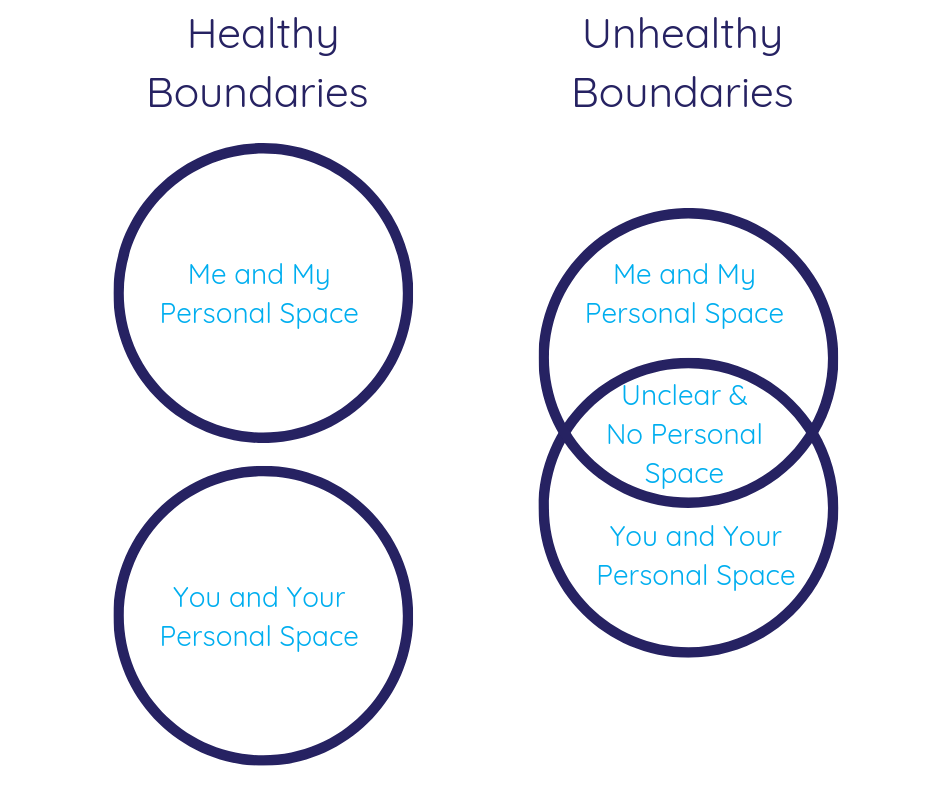
Check out this video to learn more about the power of letting go of the past:
Related Reading: How to Accept the Past of Your Partner: 12 Ways3. Spend time alone
Another great idea for setting boundaries in a relationship is to continue pursuing your hobbies and dreams.
Regularly go on dates with yourself.
This will help you maintain your independence and ensure you don’t get so tangled up in your relationship that you don’t know who you are without it.
4. Make plans with friendsStarting a new relationship is exciting. You’re thrilled by spending all of your free time with your spouse, but don’t forget to do things with your friends as well.
Talk about relationship boundaries regarding friendships.
For example, tell your spouse that you don’t want to give up private time with your friends just because you’re in a new relationship.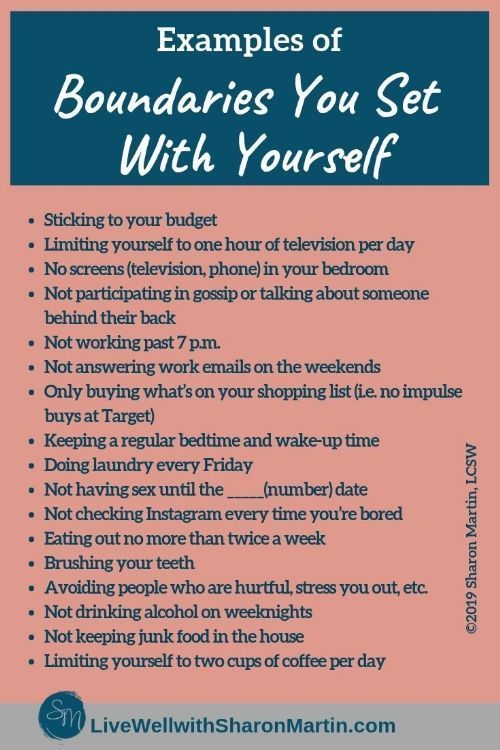
Related Reading: 20 Ways to Create Alone Time When You Live With Your Partner5. Talk about fidelity
Fidelity is an important topic to discuss when setting boundaries in relationships, especially new ones.
How do you and your spouse feel about:
- Dancing with other people?
- Flirting with other people?
- Engaging in sexual activity online? (Such as watching pornography, entering sex chats, or sending nudes)
Starting a new relationship is the perfect time to discuss what constitutes cheating to both you and your spouse.
It is also beneficial to discuss your emotional cheating boundaries (fantasizing about someone else, discussing past sexual encounters, or having an emotionally intimate relationship with someone else.)
6. Be honest about what you’re bringing into the relationshipYou do not have to air your baggage to a new partner the minute you become a couple, but being in a relationship means telling the truth about certain things.
- Do you have children from a previous relationship?
- Are you currently in-between jobs?
- Are you deathly allergic to pets (or unwilling to part with your beloved pooch, even if your partner is allergic)?
Your new partner isn’t entitled to know all of your secrets just because you’re in a relationship, but knowing some of the things mentioned above is a kind courtesy.
7. Money talksAccording to a study of money and marriage, disagreements about finances are one of the more repetitive and unresolved couples’ arguments.
While you certainly shouldn’t be laying your financial resume out at the beginning of a relationship, it can be helpful to discuss such points as:
- Are you comfortable lending money in romantic relationships?
- How do you feel about dinner dates (do you expect one partner to pay, do you prefer to pay for yourself, or do you like to go in 50/50)
- Do you prefer to keep financial talk off the table completely?
Letting your partner know about financial boundaries to set in relationships will help them avoid overstepping in your money matters.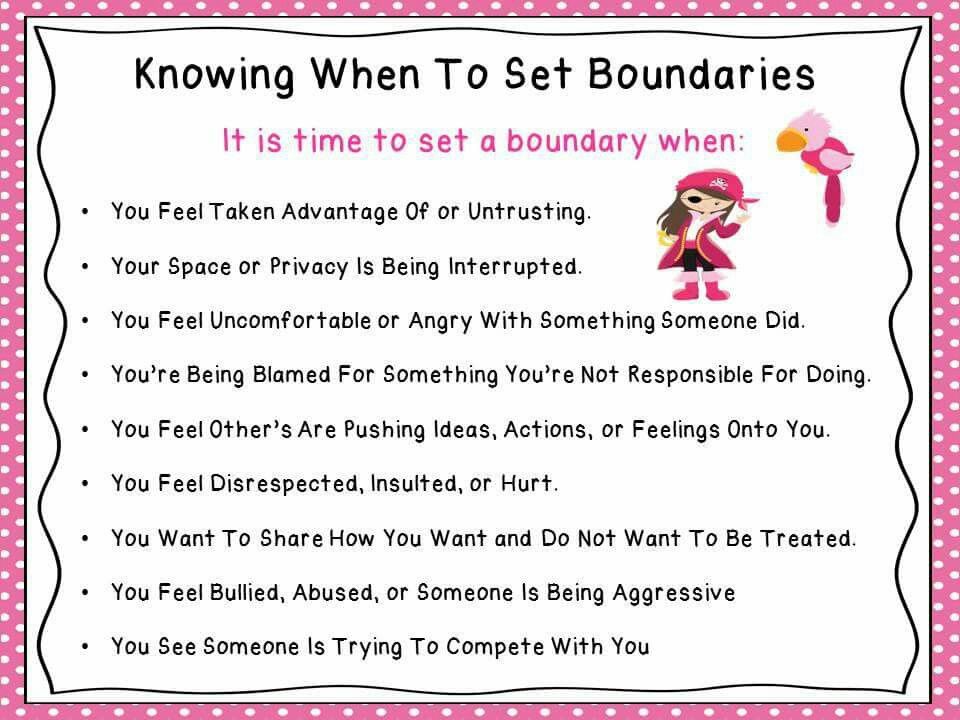
Related Reading: Why Couples Need to Talk About Money8. Discuss your family
It can be helpful to discuss your family dynamic when settings boundaries in a relationship.
If you are close to your family and want to see them regularly (with or without your spouse), let your partner know this is a non-negotiable.
Similarly, let your spouse know if you are uncomfortable having your or your partner’s family know about private relationship matters.
9. Be clear about your deal breakersTelling your partner about your deal-breaker boundaries in relationships doesn’t have to be scary or intimidating.
You don’t need to be rude or overbearing by telling your spouse what makes you uncomfortable.
Be respectful and kind when telling them what you are and are not looking for in a new relationship and ask them what their deal-breakers are, too.
Related Reading: 21 Deal Breakers in a Relationship That Are Non-Negotiable10.
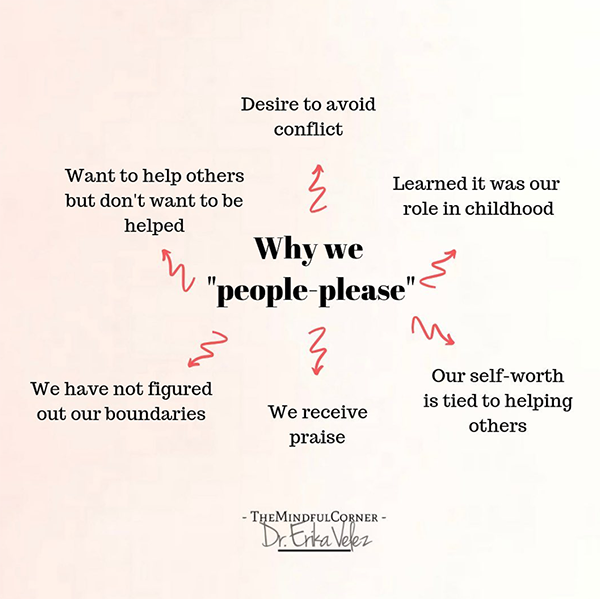 Talk about problem-solving techniques
Talk about problem-solving techniquesThe era of the beginning of relationships has a beautiful charm, but disagreements will inevitably arise, and the sooner you talk about argument boundaries in relationships, the better.
Talk to your spouse about setting healthy conflict resolution techniques and not bringing up past mistakes to win an argument or using foul language and insults to make a point. This is an important step in setting boundaries in a new relationship.
Discuss a strategy for coming together to discuss the problem and how you can solve it as a team.
11. Treat your partner how you want to be treatedSometimes actions speak louder than words. If you are new to setting boundaries in a new relationship, modeling how you want to be treated can be an effective tool for building healthy boundaries.
For example, don’t be a hypocrite if you tell your partner that you aren’t comfortable with them checking your phone or taking something without asking first.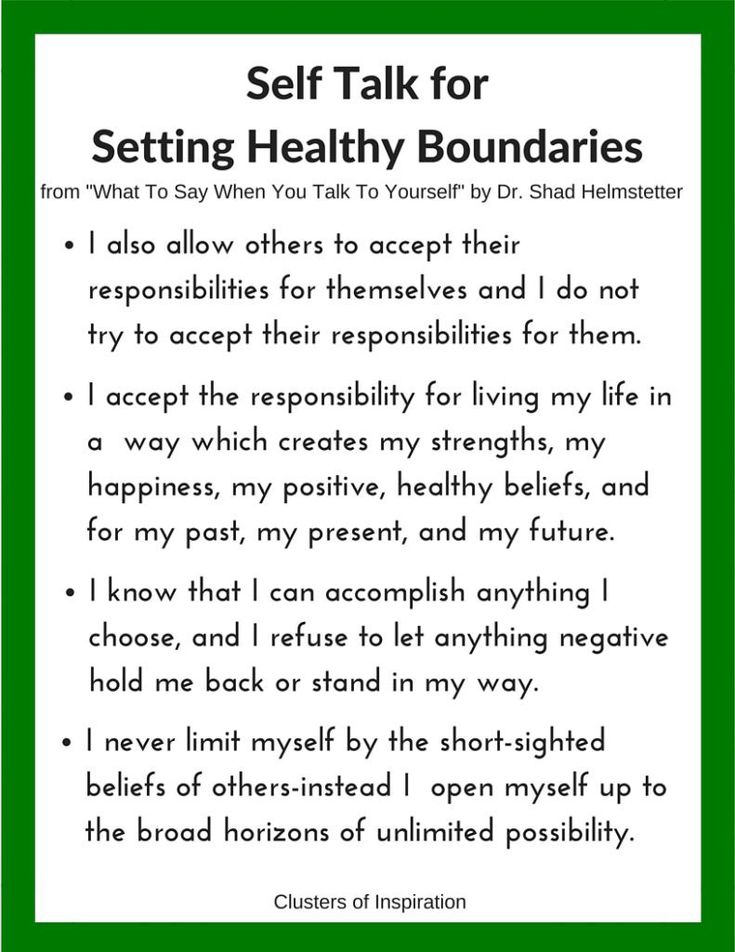
Treat your spouse how you want to be treated by showing them the same respect that you are asking for.
12. Do some soul-searchingSetting boundaries in a new relationship is important if you want to build a healthy partnership, but it doesn’t always come easy.
Do some soul-searching to identify your limits and permit yourself to share that relationship boundaries list with the person you care about.
Related Reading: Soul Connection: 12 Types Of Soul Mates & How To Recognize Them13. Talk about socials
While setting boundaries in a new relationship, one of the most significant boundaries in relationships that is surprisingly easy to cross has to do with social media.
Talk to your partner openly about your social media. Some topics for discussion include:
- Do you want to share passwords, or do you think that borders on controlling?
- Are you friends with your exes/does your spouse have friends that make you feel weird?
- Do you want your relationship shared online or would you rather keep it private?
Everyone gets to decide what does and does not make them uncomfortable regarding new relationships and social media.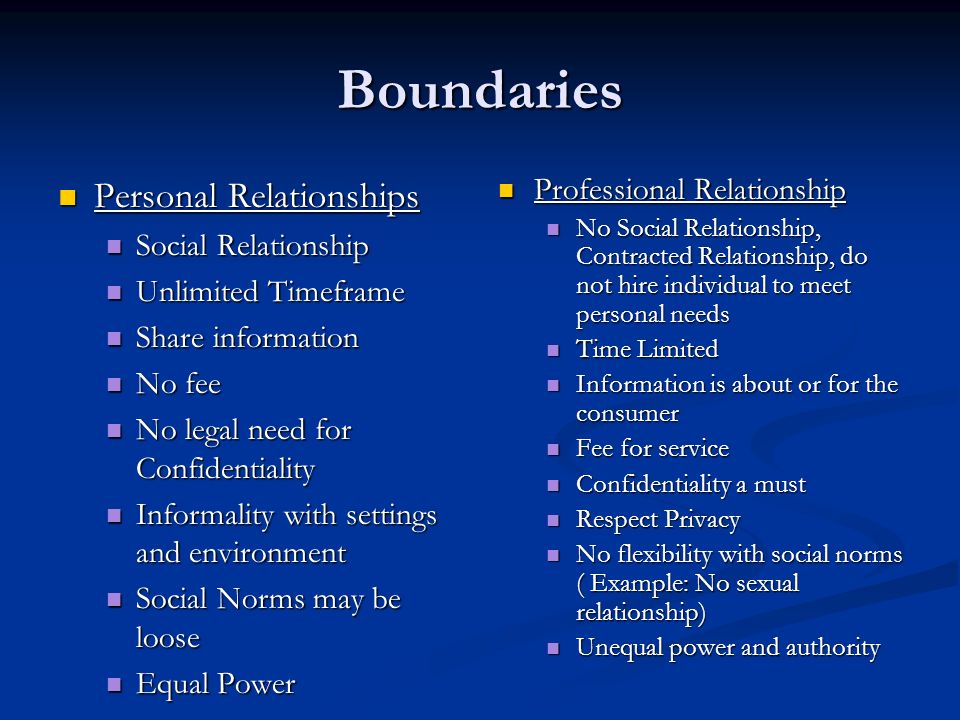
“No, I’m not comfortable doing that.”
It’s an easy sentence, so why is it so difficult to say to someone when you’re in a new relationship?
Dating boundaries are important to establish but can be incredibly awkward to vocalize. In large part, it comes down to the word “No.”
You want the object of our affection to like you. You don’t want to be seen as difficult or demanding by the person you have romantic feelings for.
If that’s how you feel, start practicing saying “No.”
Be confident in the good relationship boundaries you are trying to establish and remind yourself that saying “No” is all part of starting a new relationship on the right foot.
15. Be yourselfOne of the biggest tips for setting boundaries in a new relationship is to be yourself from the very beginning of a relationship.
Don’t change who you are to fit someone else. If something makes you uncomfortable, don’t pretend to love it just because your partner does.
The more authentic you are, the easier it will be to make that relationship boundaries list a reality.
Related Reading: 10 Ways on How to Put Yourself First in a Relationship and WhyConclusion
Relationship boundaries are essential for creating a strong, respectful partnership.
Boundaries help your partner know what both your physical and emotional limits are.
Communication is essential for setting boundaries in a new relationship. Get to know each other’s limits and revisit them as they change.
Maintaining your identity is essential when setting dating relationship boundaries. Continue to spend alone time with friends, family, and yourself to maintain your independence.
Show your spouse love and respect their boundaries too.
Creating boundaries in relationships will build a love that will last a lifetime.
Personal boundaries: what they are, how to build and defend them
It would be convenient if each person was accompanied by clear instructions - do not touch here, do not touch this topic, the following is permissible in sex, views are moderately open, I do not lend.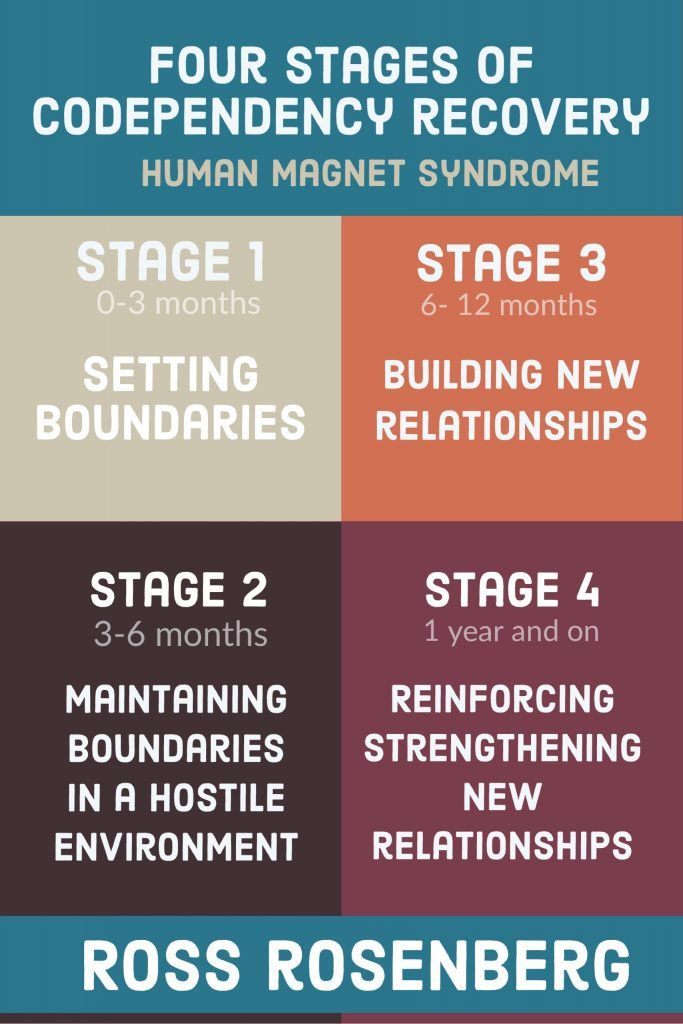 It would also be amazing if this instruction changes in real time, adjusting to our new needs, periods in life, certain people, personal crises and discoveries. But such a document is not issued anywhere, so people around can only guess - by indirect signs and personal interpretations - where everyone's comfort zone ends. What is there, even the person himself is not always aware of what is good and what is bad.
It would also be amazing if this instruction changes in real time, adjusting to our new needs, periods in life, certain people, personal crises and discoveries. But such a document is not issued anywhere, so people around can only guess - by indirect signs and personal interpretations - where everyone's comfort zone ends. What is there, even the person himself is not always aware of what is good and what is bad.
- What is
- Why do we need
- How to line up
- How to protect
What are personal boundaries
Advertising on RBC www.adv.rbc.ru
Personal boundaries are invisible, but very important "fences" that separate a person, his habits, aspirations, actions and thoughts from the outside world. They are needed to protect the individual and what is valuable to her - time and energy, emotions and feelings, cultural, religious and ethical values, sexuality, personal space and even things. Too high, impenetrable boundaries can isolate from the world and lead to loneliness.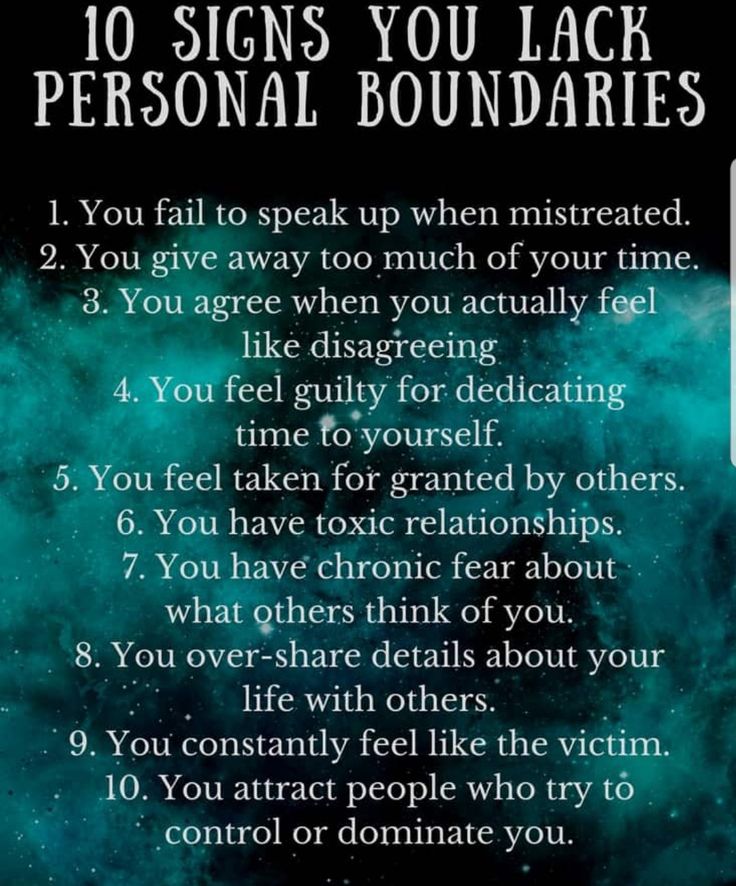 The absence of borders threatens with loss of identity and stress from constant interventions from outside.
The absence of borders threatens with loss of identity and stress from constant interventions from outside.
Why build personal boundaries
Strong but flexible personal boundaries help you build healthy relationships with the outside world—with your partner, family, friends, colleagues, and bosses—that keep them from becoming dangerous psychologically and sometimes physically abusive. These same boundaries carefully protect our self-esteem, help to prioritize and maintain a balance between different areas of life.
Flexibility is one of the most important qualities of personal boundaries. They can change with different people and situations, and this is perfectly normal. No one can accuse you of double standards and hypocrisy if a certain context makes communicating with someone or the situation uncomfortable for you. On the contrary, the flexibility of boundaries helps us to properly distribute energy and not waste it in vain (or internal struggle with discomfort).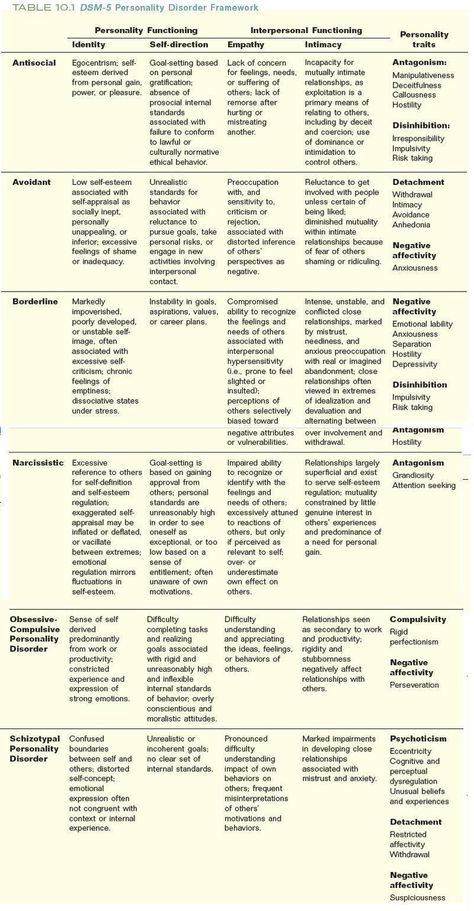
Close to the heart: what is high sensitivity and how to live with it
Finally, as paradoxical as it sounds, it is the boundaries that help us to be vulnerable - to allow ourselves to be weak, imperfect, and therefore alive. For example, you are in a crisis. Under pressure from outside - when loved ones interfere with unsolicited advice - I want to close myself from everyone, which can only aggravate the condition. On the contrary, if you are aware and vocal that you are not yet ready to discuss your condition, it will be easier for you to take the first step - to violate your own boundary and come out to have a frank conversation when you feel safe.
A scene from Sex Education
© imdb.com
How to build personal boundaries
Our upbringing, culture, mentality and signs of the times, personality and character traits, life experience, family relationships and current life situation - everything it affects how we subconsciously form personal boundaries.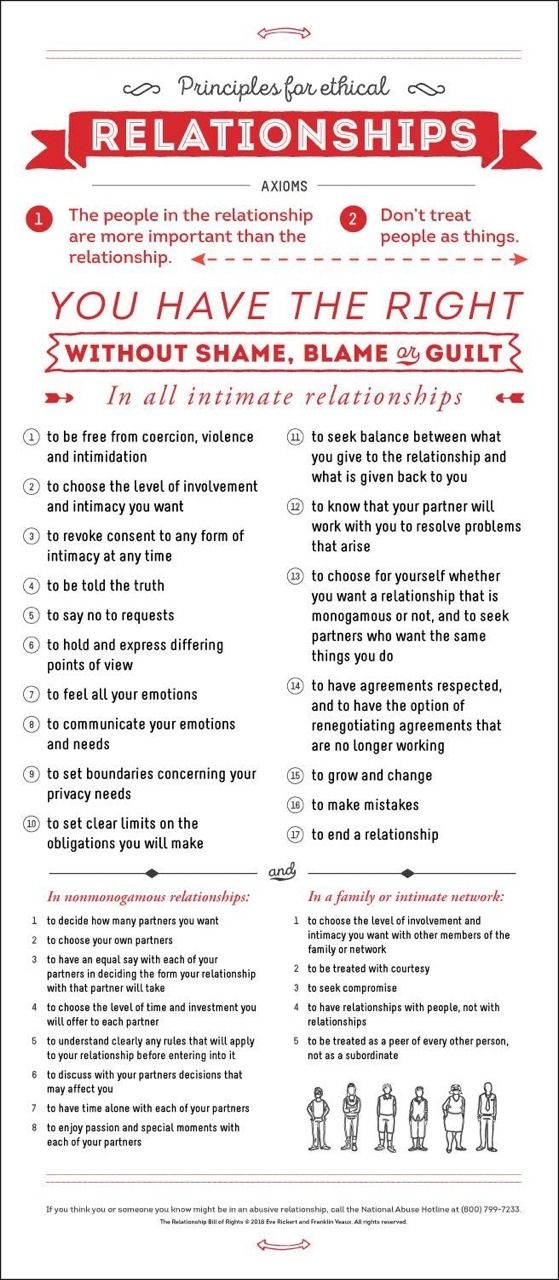 In order to understand them, you can answer a few questions.
In order to understand them, you can answer a few questions.
What are you entitled to?
This is a simple but important question - it helps to remember that every person has basic rights that he can exercise without a twinge of conscience. The right to say no, to refuse an offer, and not feel guilty. The right to expect to be treated with respect, to think about your desires and needs no less than about the needs of other people, the right not to live up to someone's expectations, and - very importantly - the right to make a mistake. This is the minimum by which you can define your personal boundaries.
How do you feel?
A situational question that you should periodically ask yourself in a variety of situations. How do you feel when a friend wants to discuss your personal life with you. What do you feel when you once again have to linger in the office, when someone asks a question about your life situation, touches on the topic of politics, asks to borrow money or some thing.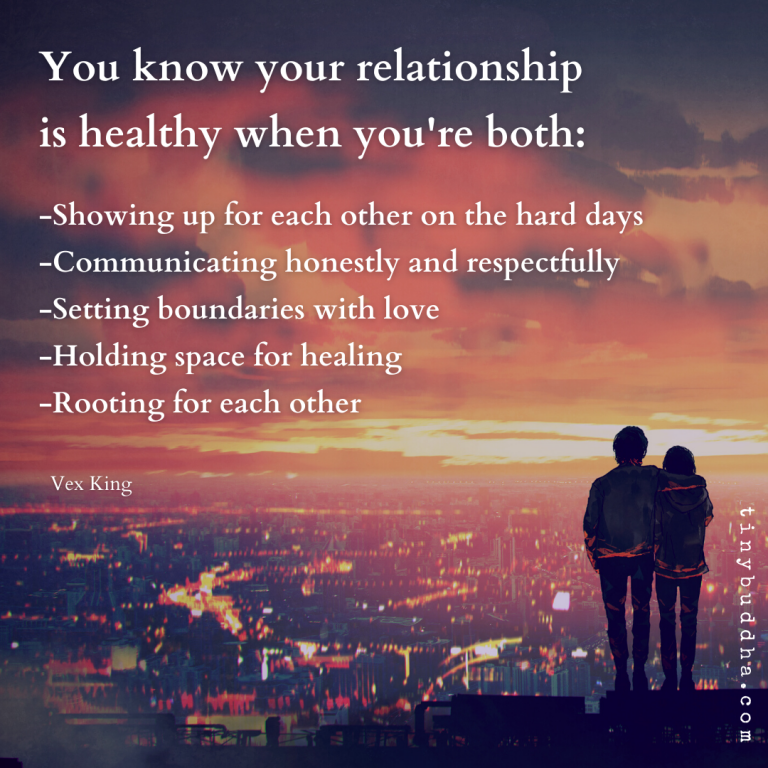
Obvious signs of discomfort:
- dry mouth;
- palpitations;
- sweating;
- irritation.
What do you value?
Personal boundaries can and even should be built in accordance with your values. If you haven't already identified them, you can brainstorm, write down the top ten, and then reduce first to five, and then to three. Get a short list of basic and very important life guidelines. How often do you have to step over them? What things, people and situations in life make you live contrary to your ideals? Understanding this will help identify pain points.
A scene from Sex Education
© imdb.com
How to Gently Defend Personal Boundaries
When you understand what exactly you will protect, you can move on to the question "how". The main thing here is not to slide into aggression and listen to yourself. Borders tend to change, and it is better to keep track of their movement in time.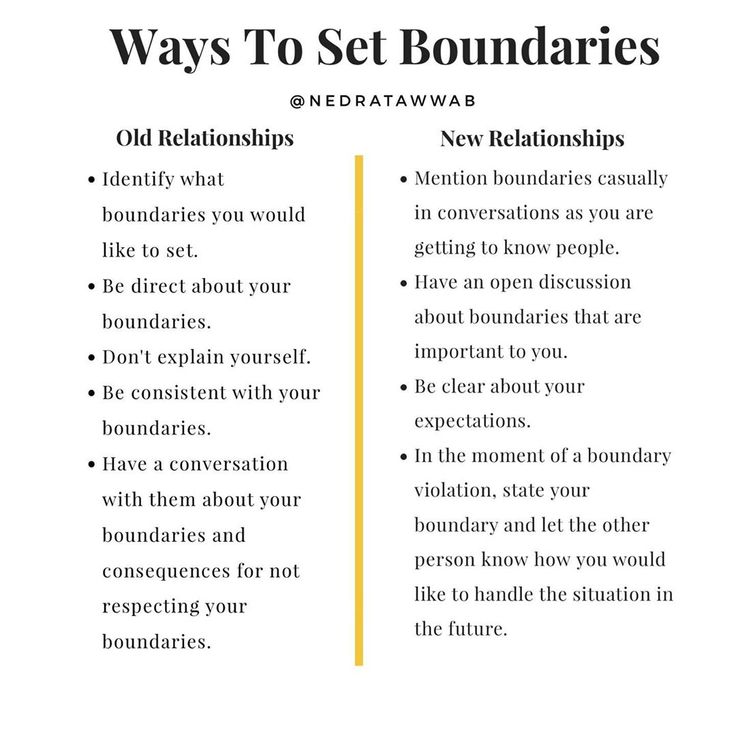
1. Be assertive
There is a big difference between assertiveness and aggressiveness. The first instills respect, the second - fear and retaliatory aggression. Perseverance does not involve bargaining, half-hints and various readings, but does not lead to accusations and attacks on the other person. “Don’t you dare touch my things” sounds aggressive. “I want to know that I have a safe place where I can write down my thoughts. That's why I feel uncomfortable when you get into my diary. Please don't do it again" sounds convincing.
2. Learn to say no
Sometimes you don't have to be pushy about why something makes you feel uncomfortable. It is enough to immediately say “no” and thereby get rid of future problems. Unfortunately, from childhood we cultivate a tolerance for discomfort - we learn to do what we do not like and agree to things that we do not want. Many are under the illusion that life for the sake of others will make them popular and loved - it seems to us that in no case should we refuse, otherwise we will remain lonely and useless. But, as the old psychologist joke goes, one can say that therapy bears fruit when the patient ceases to be liked by everyone in the world. Because this is impossible when competent personal boundaries are built. And they need to be respected - both their own and others.
But, as the old psychologist joke goes, one can say that therapy bears fruit when the patient ceases to be liked by everyone in the world. Because this is impossible when competent personal boundaries are built. And they need to be respected - both their own and others.
If your interlocutor has stopped looking at you, nods nervously, looks suddenly agitated, or just calms down - slow down and close the topic. Or gently ask if everything is okay. After all, while personal boundaries may not be visible, they can be felt with a little care.
Why self-doubt is normal and how to live with it in a crisis .
Tags: psychology
I'm in the house: how to set boundaries
Personal boundaries are a line that runs between individuals, the people around them, and larger social systems. They are needed so that we can clearly feel: where I am, and where I am not; where are my own emotions, actions, beliefs and thoughts, and where are others. And if these emotions and thoughts are mine, then I am responsible for them and control them. Borders also protect our inner world from outside encroachment.
They are needed so that we can clearly feel: where I am, and where I am not; where are my own emotions, actions, beliefs and thoughts, and where are others. And if these emotions and thoughts are mine, then I am responsible for them and control them. Borders also protect our inner world from outside encroachment.
They may look like a five-meter stone fence with barbed wire and machine gunners on the towers. Or they may be absent altogether - all the doors will be wide open. Boundaries can change depending on the context and environment, become solid for some people and completely blurred for others.
Personal boundaries can be opened for "import", when we gladly accept other people's help, resources, time, money, etc., or for "export" - our own resources. We usually import what we especially need, and we export either what we have in abundance, or what we hope to get a good price for.
Boundaries are needed to mark two important issues:
1.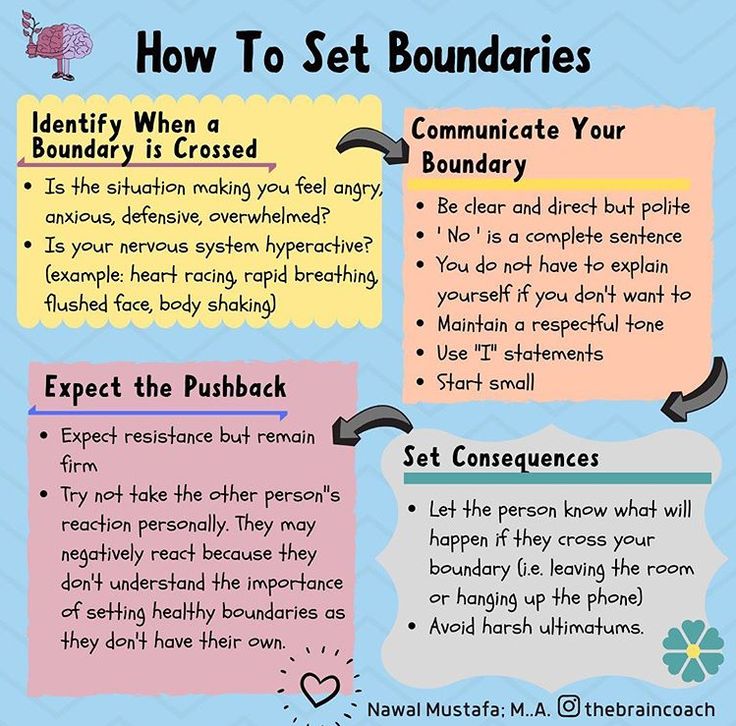 What do I consider my property (and, accordingly, I will protect)?
What do I consider my property (and, accordingly, I will protect)?
2. What am I responsible for (and will try to control)?
Boundary checking
How does this manifest itself in specific behavior? There are people for whom property boundaries can be very arbitrary. Such a person does not consider anything his own, inviolable, he "does not become attached to things." He cannot close himself in his room because he considers it impolite. Such people cannot refuse help or money, even realizing that this money will not come back. Their borders are always open for imports, it is important for them that people see them as kind, generous and open. It's a way to build relationships. Sometimes they even think that having nothing of their own is safer.
The opposite type is people whose boundaries are too wide. They consider everything their property - wife, children, employees, office or apartment space, other people's things and time.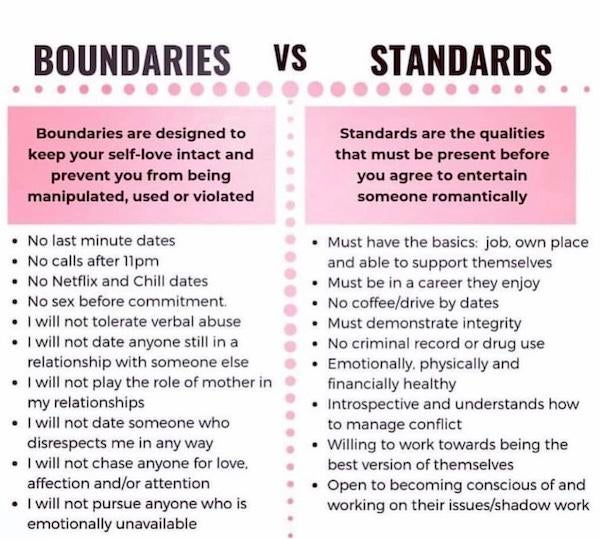 They do not see other people's boundaries and do not consider it necessary to observe them. Wherever such a person is, there is always “too much” of him, he captures the space around him. And if he was not given something in a good way, he can take it away "in a bad way."
They do not see other people's boundaries and do not consider it necessary to observe them. Wherever such a person is, there is always “too much” of him, he captures the space around him. And if he was not given something in a good way, he can take it away "in a bad way."
Two "extreme" types also exist in relation to responsibility. There are people who take on too much, trying to control what is beyond their control. Such a wife thinks that her husband yelled at her because she did not have time to set the table on time or did not clean up well enough. People agree with every charge brought against them. The logic is this: if I tried better (guessed other people's desires and did everything right), then this would magically change those around me, make them happy and loving. People with such a strategy of thinking lack recognition and praise, they are ready to do everything to get this simple currency.
The other extreme is characters who are not ready to take responsibility not only for others, but also for themselves.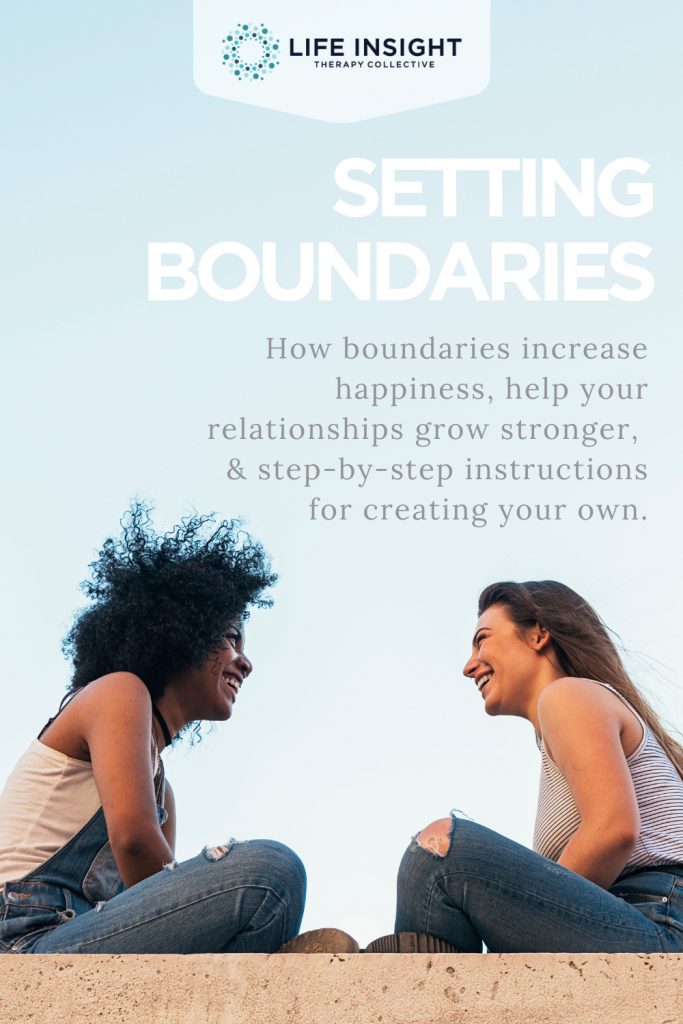 They do not see their contribution to the development of conflict situations, do not accept criticism and try to avoid any obligations. If you entrust them with a project, they will either require a partner or will come running every half hour with questions and clarifications so that the responsibility does not lie with them (or at least not with them alone). Men with a fear of responsibility are almost elusive for marital or paternal obligations. They consider them a violation of their boundaries, because the family will force them to change their usual way of life.
They do not see their contribution to the development of conflict situations, do not accept criticism and try to avoid any obligations. If you entrust them with a project, they will either require a partner or will come running every half hour with questions and clarifications so that the responsibility does not lie with them (or at least not with them alone). Men with a fear of responsibility are almost elusive for marital or paternal obligations. They consider them a violation of their boundaries, because the family will force them to change their usual way of life.
Border Guard Day
How to define your borders and protect them? Unfortunately, you cannot put up pegs and notify others that “this half a meter of land around me is my territory, do not enter without knocking.” Although, in fact, this is exactly what young ladies with long puffy skirts did in the old days.
In my trainings, I often do a simple exercise. I ask a person to designate a limit invisible to others, and I begin to slowly approach it - step by step. The task of the participant is to make it clear without words that I am already close to the point that I do not need to cross. The reaction is very different. Someone is very calm at first and only at the last moment begins to frown. Someone, on the contrary, from my first step “gets into a pose” and puts on “boxing gloves”. Very polite people let me close, with a bewildered smile on their face. And only then it turns out that I have long passed the intended border. There was also such an “intelligent” reaction: when a person understands that I am not going to stop and provoke him to more obvious actions, he himself takes a step back, leaving his integrity stable. But in order to stay at a safe distance from me, he has to give up his territory.
I ask a person to designate a limit invisible to others, and I begin to slowly approach it - step by step. The task of the participant is to make it clear without words that I am already close to the point that I do not need to cross. The reaction is very different. Someone is very calm at first and only at the last moment begins to frown. Someone, on the contrary, from my first step “gets into a pose” and puts on “boxing gloves”. Very polite people let me close, with a bewildered smile on their face. And only then it turns out that I have long passed the intended border. There was also such an “intelligent” reaction: when a person understands that I am not going to stop and provoke him to more obvious actions, he himself takes a step back, leaving his integrity stable. But in order to stay at a safe distance from me, he has to give up his territory.
I don't know how you would react in this exercise. Think about it.
You can defend your borders in different ways in different situations.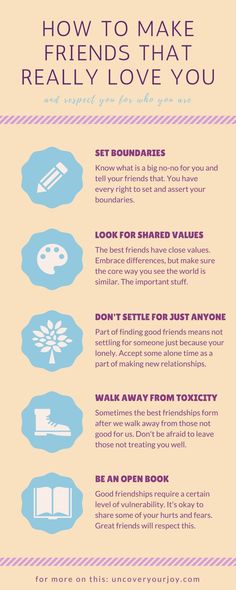 The ability to say "no" (without the subsequent sprinkling of ashes on the head!) Is an important personality skill. It is necessary for those who easily succumb to pressure, aggression and other "honest ways of taking money."
The ability to say "no" (without the subsequent sprinkling of ashes on the head!) Is an important personality skill. It is necessary for those who easily succumb to pressure, aggression and other "honest ways of taking money."
The ability to create and protect one's own boundaries, of course, is formed even by parents. But over the course of life (and with different people), boundaries can change many times. Teenagers, for example, protect them militantly, they need this life period in order to separate from their parents and learn to build their own lives on their own, to respect themselves. And couples in love sometimes completely dissolve in each other, and only then they begin to notice that it has become crowded. If you do not revise the rules of interaction in time, do not outline the circle of your interests, then the couple comes to a crisis or even breaks up.
Like any other skill, the ability to see and respect one's own and others' boundaries may well be mastered at a later period of time.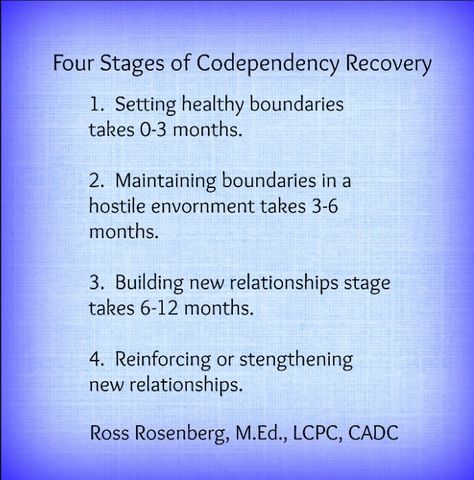
How to defend your territory
How do you react to a yelling boss? Do you get nervous before public speaking? Are you able to refuse requests from loved ones if they are inconvenient for you? Do children have the right to disagree with you, to close in their room? How do you feel when your spouse (or best friend) said something “wrong”? Do you want to suggest, correct, give a cuff, shame, do you think that the actions of loved ones “dishonor your reputation”?
The skill of respecting other people's boundaries is, first of all, allowing other people to be different from you. A good aphorism caught my eye recently: “Selfishness is not when you do what you want. This is when you are sure that others should do what YOU want. When you want to "do good" to someone - that is, to help, give advice, stand up for someone, correct the situation - pause and look around. Does this violate someone's interests, does it plunge your counterpart into a position of helplessness and dependence? Have you been asked for this help? Does the person really need this kind of help?
The main feature of "healthy" boundaries is their flexibility.



